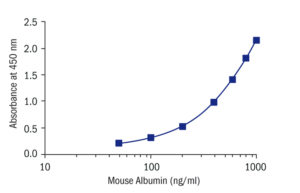Albumin Mouse ELISA
Albumin is mostly a simple hydrophilic protein present in cells and body fluids. Albumin is synthesized in the liver, and serum albumin (69 kDa, pI 4.9) occupies 56-60% of total serum proteins. Because of its large population, albumin is very important in maintaining plasma osmotic pressure. Albumin can bind hydrophobic physiological substances e.g. fatty acids, bilirubin, and thyroxine and contributes the transfer of these substances. Concentration of albumin in serum is lowered in liver cirrhosis, malnutrition, and pyrexial diseases due to decreased biosynthesis or increased consumption of albumin in, and also by secretion into urine in renal damage. In normal human subjects, excretion of albumin into urine is very little, about 30 mg/day, but increased in glomerulonephritis, nephritic syndrome, and diabetic nephropathy. Urinary albumin sometimes increases in pyrexia, hypertension, congestive heart failure (CHF), and urinary tract infection (UTI). Even in healthy human, a transient upraise of urinary albumin is observed after hard exercise, muscle work, bathing in high temperature water, mental excitement, stress, intake of much protein, and before menstruation. These are called physiological or functional or sports proteinuria (albuminuria). Orthostatic proteinuria (albuminuria) is observed in teenagers. Rare hereditary analbuminemia in human is really albumin deficiency.. A model analbuminemia rat has been established by Dr. Sumi Nagase which has been derived from Sprague-Dawley strain, and is called Nagase analbuminemia rat (NAR). Routine measurement of serum albumin is conveniently made with Shibayagi’s TIA assay kits for automatic analyzers. Shibayagi’s Albumin ELISA Kits can measure urinary albumin with high sensitivity, and are also applied to in vitro albumin biosynthesis system, checking of contamination with albumin in biological active substance preparations obtained by culture system, and liver transplantation experiments using NAR
Type
Sandwich ELISA, HRP-labelled antibody
Applications
Serum, Cell culture medium, Urine, Plasma
Sample Requirements
5 µl/well
Storage/Expiration
Store the complete kit at 2–8°C. Under these conditions, the kit is stable until the expiration date (see the label on the box).
Calibration Curve

Calibration Range
50–1000 ng/ml
Limit of Detection
2.5 ng/ml
Intra-assay (Within-Run)
n = 5; CV = 5.0%
Inter-assay (Run-to-Run)
n = 5; CV = 5.0%
– Fujii M, Inoguchi T, Maeda Y, Sasaki S, Sawada F, Saito R, Kobayashi K, Sumimoto H, Takayanagi R. Pitavastatin ameliorates albuminuria and renal mesangial expansion by downregulating NOX4 in db/db mice. Kidney Int. 2007 Aug;72 (4):473-80
– Iwashita K, Nagashima H. Rubratoxin B induces interleukin-6 secretion in mouse white adipose tissues and 3T3-L1 adipocytes. Toxicol Lett. 2008 Nov 10;182 (1-3):79-83
– Kaburagi T, Yamano T, Fukushima Y, Yoshino H, Mito N, Sato K. Effect of Lactobacillus johnsonii La1 on immune function and serum albumin in aged and malnourished aged mice. Nutrition. 2007 Apr;23 (4):342-50
– Kato H, Ishida J, Nagano K, Honjo K, Sugaya T, Takeda N, Sugiyama F, Yagami K, Fujita T, Nangaku M, Fukamizu A. Deterioration of atherosclerosis in mice lacking angiotensin II type 1A receptor in bone marrow-derived cells. Lab Invest. 2008 Jul;88 (7):731-9
– Kato K, Kosugi T, Sato W, Arata-Kawai H, Ozaki T, Tsuboi N, Ito I, Tawada H, Yuzawa Y, Matsuo S, Kadomatsu K, Maruyama S. Growth factor Midkine is involved in the pathogenesis of renal injury induced by protein overload containing endotoxin. Clin Exp Nephrol. 2011 Mar 1;
– Mita Y, Ishihara K, Fukuchi Y, Fukuya Y, Yasumoto K. Supplementation with chromium picolinate recovers renal Cr concentration and improves carbohydrate metabolism and renal function in type 2 diabetic mice. Biol Trace Elem Res. 2005 Summer;105 (1-3):229-48
– Shiraki N, Umeda K, Sakashita N, Takeya M, Kume K, Kume S. Differentiation of mouse and human embryonic stem cells into hepatic lineages. Genes Cells. 2008 Jul;13 (7):731-46
– Soto-Gutierrez A, Navarro-Alvarez N, Rivas-Carrillo JD, Tanaka K, Chen Y, Misawa H, Okitsu T, Noguchi H, Tanaka N, Kobayashi N. Construction and transplantation of an engineered hepatic tissue using a polyaminourethane-coated nonwoven polytetrafluoroethylene fabric. Transplantation. 2007 Jan 27;83 (2):129-37
– Soto-Gutierrez A, Navarro-Alvarez N, Zhao D, Rivas-Carrillo JD, Lebkowski J, Tanaka N, Fox IJ, Kobayashi N. Differentiation of mouse embryonic stem cells to hepatocyte-like cells by co-culture with human liver nonparenchymal cell lines. Nat Protoc. 2007;2 (2):347-56
– Takeuchi T, Ochiya T, Takezawa T. Tissue array substratum composed of histological sections: a new platform for orienting differentiation of embryonic stem cells towards hepatic lineage. Tissue Eng Part A. 2008 Feb;14 (2):267-74
– Tsutsui M, Ogawa S, Inada Y, Tomioka E, Kamiyoshi A, Tanaka S, Kishida T, Nishiyama M, Murakami M, Kuroda J, Hashikura Y, Miyagawa S, Satoh F, Shibata N, Tagawa Y. Characterization of cytochrome P450 expression in murine embryonic stem cell-derived hepatic tissue system. Drug Metab Dispos. 2006 Apr;34 (4):696-701
– Tsutsui M, Ogawa S, Inada Y, Tomioka E, Kamiyoshi A, Tanaka S, Kishida T, Nishiyama M, Murakami M, Kuroda J, Hashikura Y, Miyagawa S, Satoh F, Shibata N, Tagawa Y. Characterization of cytochrome P450 expression in murine embryonic stem cell-derived hepatic tissue system. Drug Metab Dispos. 2006 Apr;34 (4):696-701

